“Participation from Hundreds of Enterprises, with Positive Outcomes Achieved in the Pilot Program.”
Recently, China’s Ministry of Transport held a quarterly press conference. During the conference, Mr. Cen Yanqing, Director of the Science and Technology Department of China’s Ministry of Transport, mentioned that the Ministry’s first batch of 14 pilot tasks in the field of autonomous driving received enthusiastic responses. Over a hundred innovative entities actively participated, deploying over a thousand autonomous vehicles of various types. The pilot programs have yielded positive results.
It is reported that these 14 pilot projects cover various low-speed autonomous driving scenarios, including ports, logistics parks, scenic areas, urban transportation services, and last-mile deliveries. The following CMRA editorial team has compiled the latest application status of participating companies and their products in each pilot project.
Pilot Program for Autonomous Urban Transportation Services and Logistics in Beijing
The implementation period of this pilot project is from August 2022 to December 2023. It plans to deploy 38 autonomous passenger cars, 5 autonomous buses, 65 unmanned delivery vehicles, and 80 unmanned vending vehicles.
Under the pilot project, Baidu’s ‘Luobo Kuairao’ and Xiaomi Zhixing obtained the ‘Unmanned Vehicle Remote Phase’ testing permits by the end of 2022, each deploying 10 vehicles for full unmanned testing. In February of this year, both companies were granted demonstration application permits, and in September, they were granted permission to operate in-vehicle unmanned Robotaxis for a fee in Beijing’s Yizhuang area. This marks the orderly entry of the autonomous driving transportation industry into the revenue-generating phase.

Xiaoma Zhixing(小马智行) Autonomous Vehicles Conduct Testing in Beijing
In November 2022, Light Boat Intelligent Navigation opened the city’s first demonstration route for intelligent connected passenger buses, known as the ‘Yangfan Line,’ in Beijing’s Economic-Technological Development Area. Autonomous minibusses officially carried passengers on urban roads. In March of this year, two more autonomous vehicles were deployed in Beijing’s Economic-Technological Development Area to officially open the city’s first autonomous minibus education route.
New Stone Age has more than 200 vehicles in regular operation in Beijing’s Economic-Technological Development Area, providing diversified services for smart cities, including unmanned retail and unmanned delivery. Yunda Beijing Nanhai Branch Xingye Service Center has deployed more than 30 New Stone Age unmanned vehicles, assisting the branch in delivering nearly 10,000 parcels daily.
Tianjin Port Container Horizontal Transportation Autonomous Driving Pilot Program
The implementation period of this pilot program is from August 2022 to December 2023, with plans to deploy 76 intelligent transport vehicles at the C-terminal dock of Tianjin Port.
The C-terminal intelligent container terminal in the North Jiang Port Area of Tianjin Port took 21 months to construct and officially commenced operation on October 17, 2021. It is the world’s first ‘smart zero-carbon’ terminal.

76 ART Vehicles Have Been in Full-Load Operation for Over 22 Months in the North Jiang Port Area of Tianjin Port
The project deployed 76 Intelligent Transport Vehicles (ART), jointly developed by XCMG Group and Mainline Technology. Huawei was responsible for constructing the fleet management system, while Xijing Technology provided the intelligent dispatching FMS system and equipped some ART devices with autonomous driving smart systems. Currently, all 76 ART vehicles have been in full-load regular operation for over 22 months.
Pilot Program for Autonomous Urban Transportation Services and Logistics in Changchun
The implementation period of this pilot project is from August 2022 to December 2023. It plans to deploy 8 autonomous buses in areas such as the FAW Group headquarters park and the National Intelligent Connected Vehicle Application (Northern) Demonstration Zone. Additionally, 2 autonomous logistics reverse transport vehicles will be deployed on a dedicated route from the FAW-Volkswagen company plant to the FAW Intelligent Logistics Park.
Under the pilot project, in March of this year, the Hongqi intelligent minibus developed by FAW Group conducted road demonstration applications and testing in the National Intelligent Connected Vehicle Application (Northern) Demonstration Zone. The vehicle is controlled by an autonomous driving system developed independently by FAW and can be used for autonomous driving scenarios within enclosed parks. Demonstrations have taken place at Beijing Nanhaizi Park and the Summer Palace.
The dedicated route from the FAW-Volkswagen company plant to the FAW Intelligent Logistics Park is 8.2 kilometers long and serves as the country’s first dedicated passage for transporting passenger vehicles. One autonomous logistics reverse transport vehicle can transport 9 passenger vehicles in a single trip.
Pilot Program for Autonomous Horizontal Transportation and Port Logistics in Shanghai Port Area
The implementation period of this pilot project is from August 2022 to December 2023. It plans to deploy no fewer than 60 intelligent transport vehicles in the Waigaoqiao Port Area and no fewer than 60 autonomous container trucks in the Yangshan Port-Donghai Bridge-Lingang Industrial Park area.
The main participating unit in this project, Youdao Zhitu, was jointly initiated by SAIC Group and Shanghai Port Group. In the Waigaoqiao Fourth Port Area of Shanghai Port, Youdao Zhitu began closed-loop development and testing of its autonomous electric intelligent transport vehicle (AIV) project in March 2022. Currently, the AIV operates routinely in all scenarios, processes, and domains, allowing for mixed operation, usage, and scheduling.
Youdao Zhitu launched commercial operations of intelligent heavy-duty trucks in Yangshan Port in 2019. As of now, they have covered more than 6 million kilometers in cumulative operating mileage and completed over 250,000 TEU intelligent transport tasks. Youdao Zhitu stated that after the production of Level 4 autonomous heavy-duty trucks, they will conduct routine autonomous commercial operations between the collection and distribution center, the Donghai Bridge, and the automated terminal in Yangshan Phase IV. They aim to establish a fleet of hundreds of trucks and strive to achieve the capability for million-container-level autonomous commercial operations by 2025.
Pilot Program for Autonomous Urban Transportation Services and Logistics in Fengxian District, Shanghai
The implementation period of this pilot project is from August 2022 to December 2023. It plans to deploy no fewer than 50 autonomous passenger cars, no fewer than 5 autonomous buses, no fewer than 30 unmanned delivery vehicles, no fewer than 20 unmanned vending vehicles, and no fewer than 5 unmanned cleaning vehicles in the core area of Fengxian New City, including the ‘Shanghai Fish’ scenic area. Additionally, no fewer than 2 autonomous BRT vehicles will be deployed on the South Bridge terminus to the Jinhui Road BRT line.
Fengxian New City is the only demonstration area in China that is open to all types of vehicles, all risk categories, and all testing stages, covering multiple scenarios. The demonstration area includes a 250,000-square-meter underground testing area, a 1.3-kilometer closed test area on urban roads, a 7.8-kilometer V2X open test road, and a 97.3-kilometer open urban road network.
The Shanghai Fish, also known as ‘Jinhai Lake,’ is the core scenic lake of Fengxian New City in Shanghai, covering an area of 2.53 square kilometers. The site has already initiated autonomous shuttle experience services. The Fengxian Autonomous Driving Smart All-Travel Chain Innovation Demonstration Zone will also construct a digital twin system, digitizing all elements of transportation, including people, vehicles, roads, and the environment, to serve intelligent connected vehicle demonstration applications, regulation, and analysis scenarios.
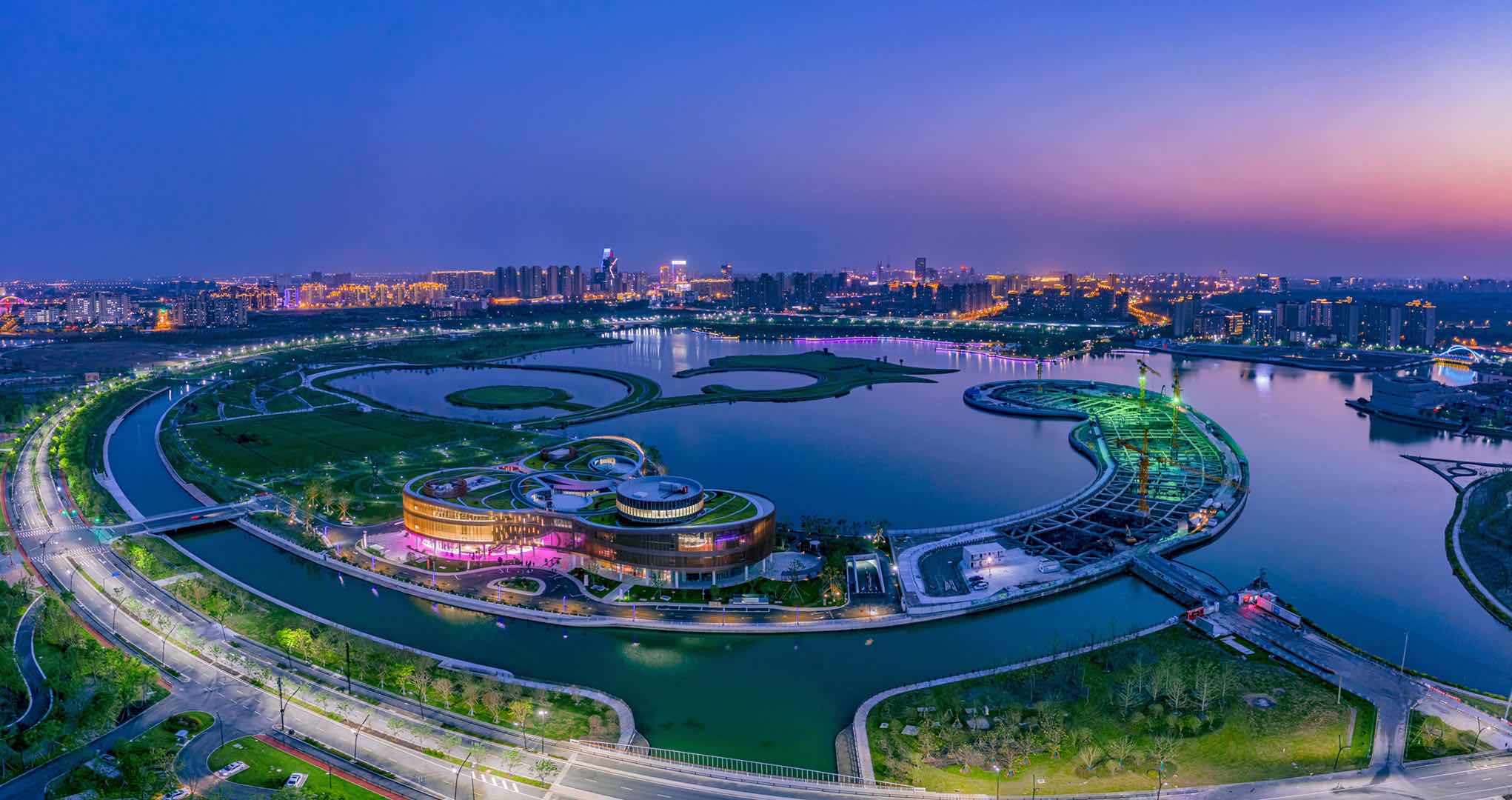
The Shanghai Fish “Jinhai Lake”
Pilot Program for Autonomous Urban Transportation Services and Logistics in Suzhou
The implementation period of this pilot project is from August 2022 to December 2023. It plans to deploy 430 autonomous passenger cars in Suzhou High-Speed Rail New City and Taihu Eco-Island, 47 autonomous buses in areas like Suzhou High-Speed Rail New City and Taihu Eco-Island, 25 unmanned cleaning vehicles on roads and in the Jinji Lake Scenic Area in Suzhou High-Speed Rail New City, and 49 unmanned vending vehicles on Taihu Eco-Island and in the Jinji Lake Scenic Area.
The intelligent connected vehicle industry is one of the characteristic industries in Suzhou High-Speed Rail New City, with a significant advantage in industrial aggregation. Currently, more than 130 companies related to intelligent connected vehicles have gathered on the ‘Intelligent Drive Avenue,’ centered around Nantiancheng Road. These companies cover over 30 sub-segments, including intelligent driving technology solutions, complete vehicles, radar, testing, maps, and more.
Currently, Suzhou High-Speed Rail New City has successfully implemented demonstration applications of autonomous minibusses, smart sanitation vehicles, and unmanned deliveries, covering a total of over 600 vehicles for various service scenarios. The total length of unmanned bus routes exceeds 20 kilometers.
In addition, applications for sightseeing vehicles, inspection vehicles, and road inspection vehicles are also being planned. On September 5th, an autonomous vehicle in Suzhou High-Speed Rail New City completed a power inspection task, making it the earliest L4-level autonomous power inspection vehicle in operation in China.
Pilot Program for Autonomous Driving in Binhai National Forest Park, Hefei
The implementation period of this pilot project is from August 2022 to June 2023. It plans to deploy 5 autonomous sightseeing vehicles on the Shanshui Luzhou to Cuiyin Dong Tourist Bus route, 3 unmanned vending vehicles in the Children’s Park, and 3 unmanned cleaning vehicles in the Fushouxi Square and the Tourist Distribution Center.
Binhai National Forest Park’s intelligent connected vehicle demonstration area is an important part of Hefei’s efforts to create an ecosystem for intelligent connected vehicles. Currently, the park operates not only unmanned sightseeing vehicles but also unmanned vending vehicles, unmanned cleaning vehicles, and unmanned security vehicles, forming a comprehensive and integrated ecosystem for intelligent connected innovation applications throughout the park.
Zhengzhou Fast Bus Autonomous Driving Pilot Application
The pilot project is scheduled to run from August 2022 to December 2023. It plans to deploy 40 autonomous driving BRT (Bus Rapid Transit) vehicles on a 24.5-kilometer bus route along the North Third Ring East Extension, East Third Ring, and South Third Ring East Extension in Zhengzhou City.
It’s understood that, compared to the Zhengdong New District Autonomous Driving Bus Line 1, the East Third Ring Autonomous Driving Bus Line has seen significant improvements in signal priority systems, blind-spot detection systems, and high-precision positioning systems. In March of this year, equipment within the stations entered the testing phase. Currently, the route has deployed four Level 3 autonomous driving vehicles for route integration testing and is expected to commence operation by the end of the year.
Guangzhou Urban Mobility Service Autonomous Driving Pilot Application
The pilot project is scheduled to run from August 2022 to December 2023. It plans to deploy 50 autonomous driving buses on the Guangzhou Tower Loop and the Biological Island Loop. Additionally, 210 autonomous driving passenger cars will be deployed in the Guangzhou Artificial Intelligence and Digital Economy Experimental Zone.
It is reported that the participating units in this project include Guangzhou Public Transport Group, in conjunction with the Ministry of Transport Institute, Wen Yuan Zhi Xing, Ruqi Travel, Wen Yuan Yue Xing, and others.
As of June this year, 50 autonomous driving buses have been gradually deployed, opening five convenient autonomous driving routes in Guangzhou, including the Guangzhou Tower Line, Biological Island Line 1, Biological Island Line 2, Pazhou Loop, and Yongjing Bay Line. These buses have covered a passenger mileage of 300,000 kilometers and served 200,000 passengers. Additionally, 190 autonomous driving passenger cars have been put into service, accumulating a mileage of 5.16 million kilometers, serving 260,000 passengers, and operating for a total of 480,000 hours.
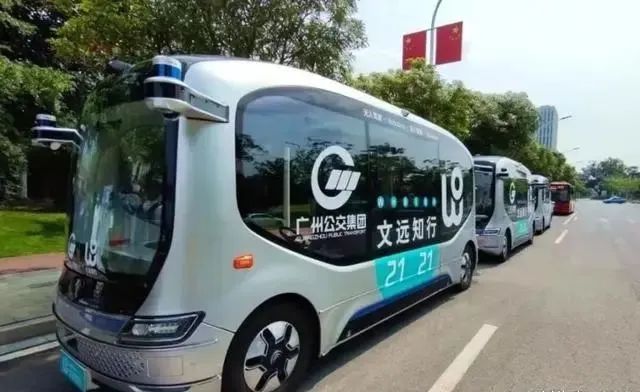
Guangzhou Deploys 50 Autonomous Buses
Western (Chongqing) Science City Autonomous Driving Pilot Application
The pilot project is scheduled to run from August 2022 to December 2023. The plan includes deploying 10 autonomous driving buses in the area between the Jinfeng Electronic Information Industrial Park and the Xiyong Comprehensive Bonded Zone, and 4 autonomous driving street cleaning vehicles in the open roads of the Jinfeng Electronic Information Industrial Park and the Science Valley Park.
In February of this year, Chongqing Science City Urban Construction Group Co., Ltd. completed the construction project design bidding for the Western (Chongqing) Science City Autonomous Driving Pilot Application, and the winning bids included Western Vehicle Network (Chongqing) Co., Ltd., China Merchants Chongqing Transport Research and Design Institute Co., Ltd., Chongqing First Sight Technology Co., Ltd., Western Science City Intelligent Networked Automotive Innovation Center (Chongqing) Co., Ltd., and China Merchants Inspection Vehicle Technology Research Institute Co., Ltd., with a total bid amount of nearly 600 million yuan.
Currently, XingShen Intelligence has won the bid for the autonomous driving unmanned delivery vehicle and autonomous driving unmanned vending vehicle procurement project for this pilot project, with a bid amount of 608,700 yuan. Hengtong Bus has won the project for autonomous driving sanitation vehicles, autonomous driving shuttle vehicles, autonomous driving unmanned cleaning vehicles, and multifunctional unmanned security patrol vehicles, with a bid amount of 8,757,800 yuan.
Xiamen Distant Sea Port Container Horizontal Transportation Autonomous Driving Pilot Application
The pilot project is scheduled to run from August 2022 to December 2023. The plan involves deploying 18 autonomous driving container trucks in Berth 17 and the F area yard of the Xiamen Distant Sea Smart Port Demonstration Zone.
It is understood that in December 2022, at Xiamen Distant Sea Container Terminal, a fleet of 20 Dongfeng “Infinite Star” third-generation autonomous container trucks achieved convoy operation. The fleet smoothly completed a series of actions, including autonomous following and precise positioning (in coordination with twist lock removal), marking the first time that Dongfeng’s autonomous container trucks independently handled unloading operations for a ship with over 230 containers, conducting intermodal operations.
In January of this year, Xiamen Port showcased the achievements of 24 Dongfeng unmanned container trucks, demonstrating multiple-zone and multi-route ship operations. The new generation of vehicles improved ship efficiency by nearly 30%, and they were used in tri-bridge intermodal operations. These applications have significantly contributed to cost reduction and efficiency improvement for port customers.
Ma Wan Port Container Horizontal Transportation Autonomous Driving Pilot Application
The pilot project is scheduled to run from August 2022 to December 2023. It plans to deploy 38 autonomous-driving container trucks in the 3rd and 4th yards as well as the frontier area in Ma Wan.
Ma Wan Smart Port is the first 5G-powered, green, low-carbon, and intelligent port in the Greater Bay Area of Guangdong, Hong Kong, and Macau. It’s the first intelligent port upgraded and transformed from a traditional general cargo terminal, incorporating proprietary knowledge and the most advanced and mature intelligent technologies. It officially commenced port operations in November 2021.
The 38 5G+ autonomous container trucks deployed in the port area all operate using the “single vehicle unmanned autonomous driving” approach. This project involves unmanned driving vehicles provided by Sany MarineStar, China National Heavy Duty Truck Group, and Zhongke Yunsan. Zhongke Yunsan offers a full-stack, Level 4 autonomous driving solution for smart ports, pioneering a round-the-clock collaborative control system for the coexistence of manually driven and autonomous container trucks. The intelligent command center, combined with intelligent cabins, enables remote control of up to 18 vehicles with a single operator.

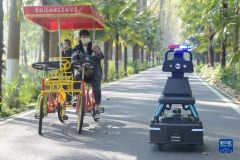
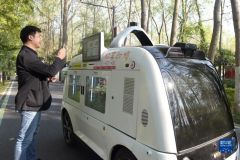
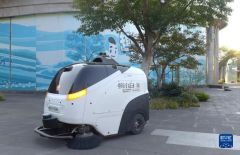
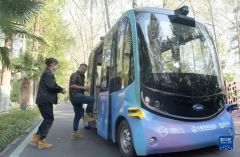
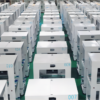







探索者论坛-scaled.jpg)
